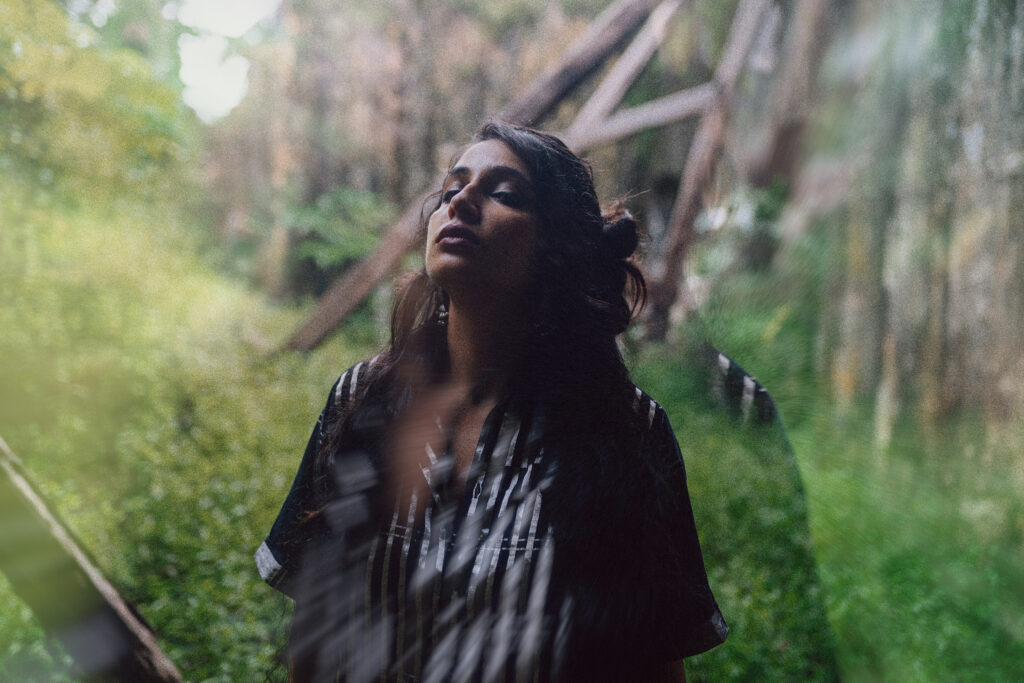Sheherazaad
(Erased Tapes)
“Microtonal South Asian vocal inflections, minimalism and hints of flamenco.” New York Times

Following her highly praised first single for Erased Tapes, “Mashoor”, Sheherazaad released her first LP ‘Qasr’ on March 1, 2024.
Today, migration seems to be encoded into everyday habits. As so many of our minds and bodies aggressively globalise in unprecedented ways, previously fixed “genres” and identities of any kind are constantly being dismantled, made redundant, and born anew.
It’s from this space of flux that American composer and vocalist Sheherazaad derives song. Produced by Arooj Aftab, her forthcoming mini-album, ‘Qasr’, was engendered during a time of family estrangement, grief over a lost elder, and the racial polarisation of her country as she knew it.
Translating to “castle” or “fortress” in Urdu, ‘Qasr’ is indeed a monument — like encapsulation of the real strains of displacement, the push and pull of diaspora, and the depravity of erasure and forgotten roots. These experiences and their inherent violence, hysteria, and romance imbue her sonic deep-dive into the world of the so-called in-between.
On new track “Dhund Lo Mujhe” (“Search For Me”), pizzicato fiddles cut through, almost unnervingly jaunty alongside her tumultuous delivery. “For me, it brings up this circus of the insane, carnival of the unhappy,” she explains. “It suggests a very specific insanity, that of the immigrant experience. There is implied bloodshed, glamour, hallucination, and schizophrenia.”
The tendency, she explains, in the US context, is for Asian people to fit the “model minority myth”, and hide the more ominous dimensions of themselves. “I want listeners to unleash all of that unabashedly,” she says. “This is about delighting in our wickedness, especially as gender expansive people, where we’ve previously had little control over our sonic narrative in Hindi and Urdu music.”
“It was maddening” Sheherazaad says, “that the music of my origins didn’t yet exist. So I knew I would have to make it.” Born to what she describes as a “fanatically art-centered, Asian-American household”, Sheher began her ear training at home, with both her parents being band musicians and her grandmother a trailblazing Indian classical concert producer. At home, she absorbed the life portfolios of Lata Mangeshkar and RD Burman, while beginning formal voice education in jazz and American Songbook from the age of six.
After years of singing competitions and performances of Western repertoire, Sheherazaad “stopped singing completely,” citing her “disenchantment with English as an emotive language” after encountering British colonial history. But she also felt a visceral disorientation resulting from long stays in India, where her mixed North and South Indian heritage further complicated and left a deep imprint on her hyphenated young psyche, and speaking accent.
Instead, she turned to experimental theatre spaces and Bollywood dance as a means to express her evolving positionality. Moving to New York for university, she quickly discovered a more radical South Asian arts community. Sheher began following the likes of the Swet Shop Boys, studying the UK’s historic Asian electronic counterculture, and eventually crossing paths with experimental Pakistani artist Arooj Aftab. “I felt determined to resurrect and recalibrate my singing voice”, she says, “to participate in this new wave I saw of diasporic music innovation and its links with political liberation.”
Relocating to California then, for vocal rehabilitation, Sheherazaad found her Northern Star in the Hindustani classical guru Madhuvanti Bhide, who helped Sheher reshape her old voice, using “gharana” methodology. In a further attempt to re-access lost heritage, Sheher also studied Arabic, Hindi, and Urdu, where she quickly advanced and wrote test lyrics. These would result in her self-released 2020 underground project Khwaabistan, and garner the attention of Aftab, who offered to produce Sheher’s next record.
Working long-distance from separate coasts during the pandemic, the pair got to work on ‘Qasr’. The collaboration would culminate in the heart of Brooklyn at the Glass Wall studio, during late-night, feverish recording sessions and utilising a groundbreaking cast of international musicianship, including Basma Edrees (Egypt), Gilbert Mansour (Lebanon), and Firas Zreik (Palestine).
On ‘Qasr’, Sheherazaad gives us a beguiling new soundscape, not yet of this world. But she also stokes the flame of fantasies inherent to the nomadic experience, which may finally be brought to the fore. Overall, the bewitching album finds an artist building her own fortress, while enticing us to forge our own castles, musical queendoms, and impossible dreamlands.